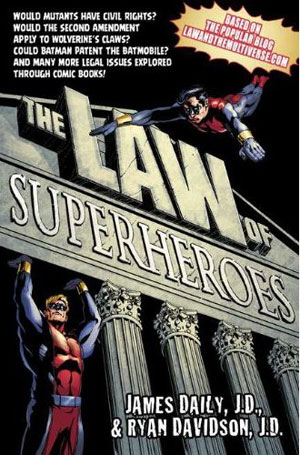In the Name of the Law!
The Law of Superheroes by James Daily, J.D., and Ryan Davidson, J.D.
So the crazy thing about comic books is how they’re not realistic at all.
And no, I’m not even talking about the stuff about people picking up automobiles and running faster than the speed of sound and flying and repeatedly dying and resurrecting. I’m not talking about the way the comics companies abuse the laws of physics, break what we know about science, and continually allow Brian Michael Bendis to write comic books when he’s clearly not up to the task.
What we’re talking about is stuff like this: When Batman finds a mugger in an alley or a bunch of gangsters breaking into a warehouse, and he beats the stuffing out of them and leaves them tied up outside the police station, what’s the most likely outcome? Crooks in jail, reduction in crime, grateful police and prosecutors? No on all counts — the crooks would go free, because getting beaten and tied up by a vigilante isn’t against the law. Besides, there’s no admissable evidence left behind, because who’s going to trust evidence given to the police by a kook in a bat costume unless he’ll testify in court — and if he testifies, he’d better be willing to take that mask off. Otherwise, the crooks walk.
Comic book law is basically a great big bucket of kookoo-bananas. Which brings us (finally!) to this book. A couple of comics-loving lawyers started up a blog called Law and the Multiverse to examine the pressing issues of how the legal profession would be different in a comic book universe, and they had enough fun with it, they put it all into a book.
So besides the question of how criminal law would deal with super-powered vigilantes, this book also covers topics ranging from civil rights for the X-Men to trademarks of superhero costumes to patents of mutated genetics to the insanity defense for supervillains to inheritance law for immortals to… well, you get the picture, I hope. There are a lot of thorny legal issues that would govern a superhero universe, and this book covers an awful lot of them.
Verdict: Thumbs up. We geeks do love debating over some of this stuff from time to time, and this is a pretty keen thing to have around, for just that reason. Are your friends arguing about whether Spider-Man could sue the Daily Bugle for libel? Haul this book out and settle the debate once and for all.
I don’t think it’d be too controversial to say that the law is a pretty dull topic, much of the time. Have you ever read much about limited liability companies? Tax law? Copyright regulations? Insurance law? It’s not a lot of fun. Adding superheroes into the mix makes things a lot more entertaining. Granted, what you learn here won’t be enough to let you pass the bar, much less defend yourself in a court of law — but making a dry subject like the law into something that’s less dry and dreary means you actually do learn a few things you didn’t know before. It’s a clever way to illustrate some of the more esoteric nooks and crannies of the legal system.
The other really neat thing about this book is how useful it can be for writers, especially writers of genre fiction. Marion G. Harmon, author of the “Wearing the Cape” series, has already mentioned that this book helped him make his novels more realistic — and more fun. And a lot of the legal issues and problems mentioned in this book could be applied to fantasy and science fiction, too.
It’s fun, at any rate, to own a book that cites both Supreme Court decisions and Silver Age Superman comics as equally valuable resources.
It’s a great book. Go pick it up.

